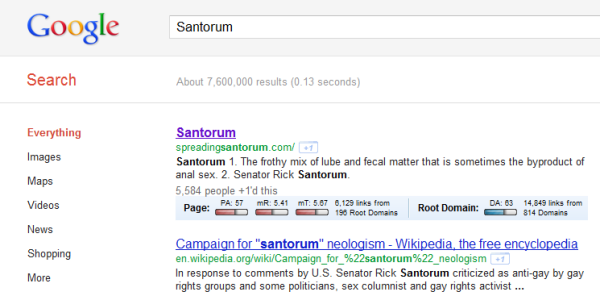While Google avoids direct political commentary on candidates, their search algorithms aren’t always so kind. In the bid the the Republican ticket, two candidates face troubles: Romney “can’t win” and Santorum faces a crappier problem.
Romney’s Odds: Didn’t You Mean….

Prior to this week, those conducting a search for political candidate Mitt Romney may have gotten a peculiar message about their spelling. If you searched for “Mitt Romney can win,” Google suggested – in its smug “didn’t you mean” way – that the correct spelling was probably “Mitt Romney can’t win.”
That suggestion is now gone, and according to a Google spokesperson cited by ABC, the change was an automatic one.
“Our algorithms are automatically refreshed to take into account the latest data available,” stated the spokesperson. “With the latest data refresh, the spell-checking feature no longer appears for this particular query.” In other words, no action seems to have been taken by Google reps or Romney’s campaign; as voters have searched for “can win” as opposed to “can’t win” more often, the robot has come to accept the “can win” attitude as legitimate.
That shift in attitude for Google’s suggestions seems to mirror the overall outlook for Romney. Recent polling shows Romney taking the lead in several key states.
The Anti-Santorum SERP Bomb
Rick Santorum, a candidate who’s currently getting 1% to 3% of the vote for the GOP nomination, has a problem that’s a bit worse. Here’s what you get when you search for “Santorum”:

This less-than-flattering result remains the third SERP option when searching for “Rick Santorum.” The reason is that gay rights activists created the site and optimized it around the candidate’s name; these actions seem to be a form of protest to Santorum’s politics.
The tactics used to get the anti-Santorum site to rank highly are known as a “Google bomb.” This approach has been used more than once before; for years, searching for the term “miserable failure” brought the official White House page for George W. Bush to the top of the SERP, and the same tactic was used for Obama’s profile. (Today, searching for the term links users to a wiki entry on Google bombing and news on the topic.)
As most Google bomb targets have been political candidates, and Google has made manual alterations more than once, a change in the anti-Santorum SERP entry wouldn’t be unprecedented. However, a Google spokesperson indicated that the company had no plans to remove the entry as it didn’t constitute a serious legal issue or a violation of Google’s terms.
Santorum commented on the Google bomb site’s high position, stating that he feels Google is intentionally allowing the term through despite the potential harm to his reputation and campaign. He further berated Google’s actions by saying that, “If you’re a responsible business, you don’t let things like that happen in your business that have an impact on the country.”

